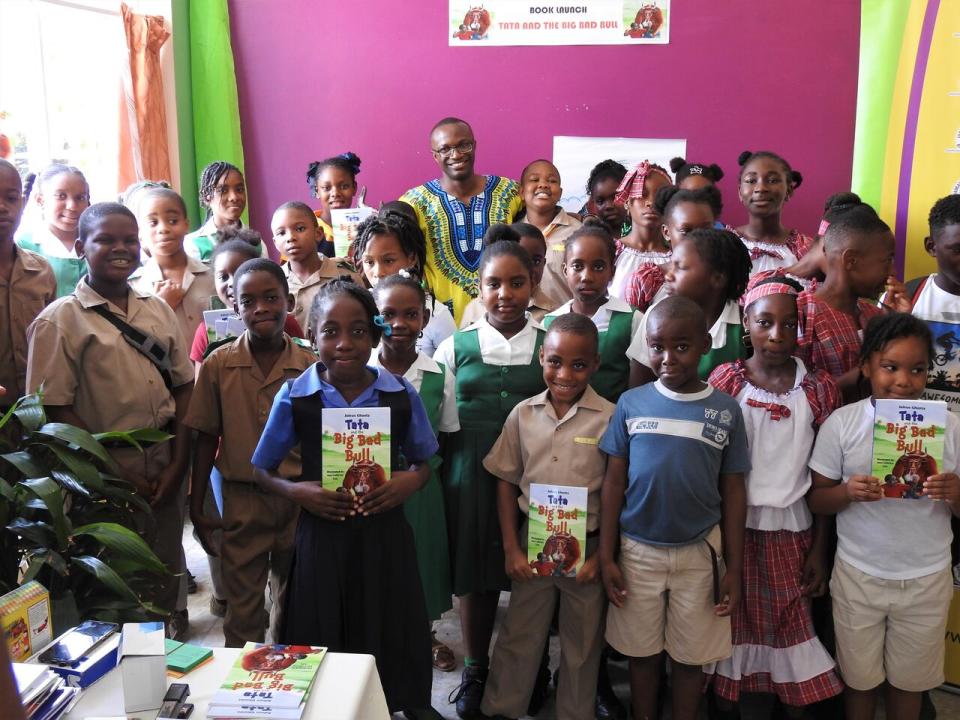He couldn't read until he was 11, but this Alberta college student won a Writers Guild mentorship

Juleus Ghunta learned to read at 11. Two decades later, the Keyano College social work student is racking up several wins including one of seven highly coveted spots in the Writers' Guild of Alberta's 2024 Mentorship Program
Gunta, a Jamaican poet and children's author, said he felt the recognition was a big relief, after several recent rejections from journals and prizes.
"When it is condensed, it does seem remarkable, but for the person going through this journey, it can be very, very difficult and frustrating," said Ghunta, a first-year social work student at Keyano, who moved from Japan in August, counting Canada as his seventh home.
"It does feel special, not just for those reasons, but the fact that I had a very difficult life, growing up as it relates to reading and literacy."
Ghunta was one of 65 candidates. The jury pairs winners with the mentor best suited for their style of writing and proposed project.
Starting in January, Ghunta will spend four months mentored by Uchechukwu Peter Umezurike, an author, poet and assistant professor at the University of Alberta.
It will be the first time the self-taught writer trains with a professional, as he completes his debut full-length poetry collection.
"There's a very strong voice there and there's a lot of purpose and intention behind what he wants to write about and the story that he wants to tell about himself," said Jason Norman, program and events coordinator with the Writers' Guild.
In its 13th year, the program has contributed to notable writing careers including award-winning authors A.J. Devlin and Ali Bryan.

Juleus Ghunta launching his children's book in Jamaica. (Submitted by Juleus Ghunta)
Ghunta's own personal story started in rural Jamaica — born to a single mom, who could only afford to send Ghuntu's older sister to school early on.
When he first started in school, Ghunta couldn't catch up. Abuse from his teachers made it worse. Then, a teacher-in-training started a reading club. Ghuntu was the first to sign up and the last to leave.
"Why did I stay?," asked Ghuntu. "She was a good teacher, but more than that, she was kind to me."
Ghuntu's writing largely explores those childhood challenges but also the aftermath.
He said he spent most of his life in hospitals misdiagnosed with various illnesses and dealing with depression, motor inhibition and blackouts.
Ghuntu eventually discovered his ailments were due to Adverse Childhood Experiences (ACE) such as poverty, abuse and racism.
On a scholarship, Ghunta completed a master's degree at the University of Bradford in peace studies, digging deep into how those stressors affected his life.
Ghuntu said he began to notice something else as well: he was healing.
"I was surprised to see how much has been written about expressive writing as a healing modality, and certainly to have made a big difference in my life."
Currently an appointee to Jamaica's task force on education, Ghuntu has also published children's books. The autobiographical Tata and the Big Bad Bull explores community, self-forgiveness and overcoming bullying.
As a kid he couldn't afford to bus to school, so Ghuntu had to walk through a pasture, regularly crossing paths with a bull that once attacked him.
"My back got stuck in the barbed wire and I ran and I ran," Ghuntu recalled ."But the bull here is a metaphor for some of the challenges that I had to overcome to accomplish my goals."
In November, Ghuntu won the 2023 WorldView Prize from the U.K.'s Poetry Archive — one of 20 winners globally.
Next March, his first peer-reviewed book chapter comes out: Working Toward Trauma-Informed Praxis: Reflections on a Shared Learning Process, by Columbia University's Teachers College Press.
Perhaps his biggest achievement however, is the eventual understanding of his grandmother's wisdom, something he said he didn't appreciate as a boy.
The lesson inspired Ghuntu's poem There Was Never Enough Salt in the Kitchen, excerpted below:
"At 14 the age I started living on my own, I would summon this memory, not of beads or bones, the memory of grandma's arms stretched wide, her guttural praise of the bush doctor's prophecy of wings. In 2019, a year before she died, I asked why she still sprinkles salt. She sent me for an atlas, told me to touch all the places I have been."

